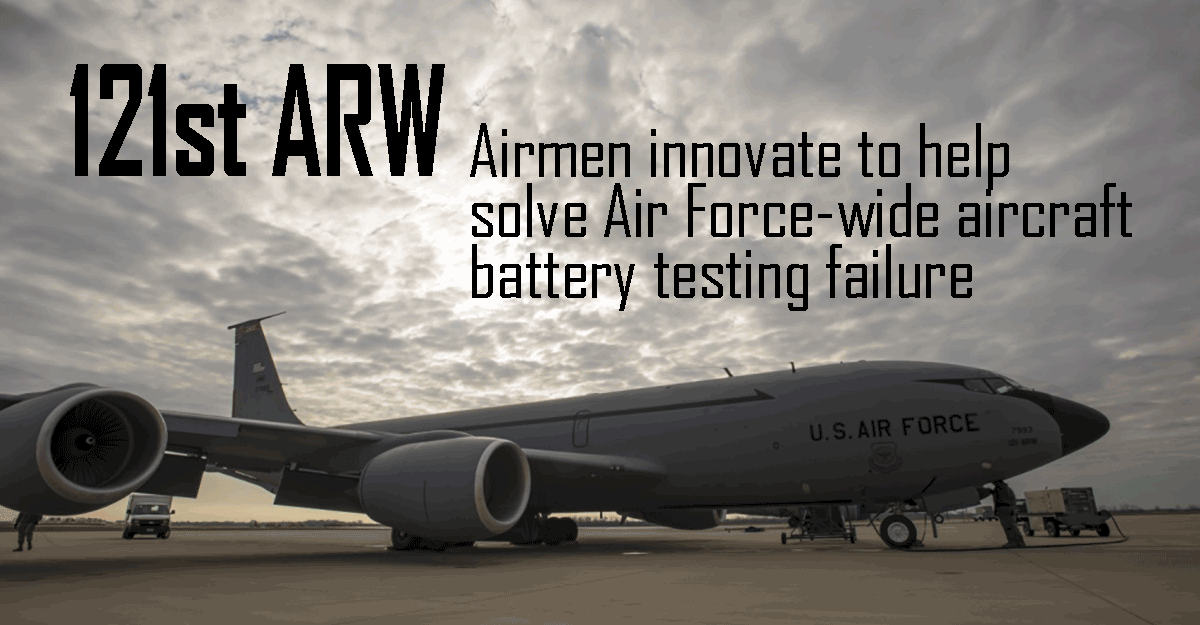121st ARW Airmen innovate to help solve Air Force-wide aircraft battery testing failure
Story by Corrie Poland, Air Force Operational Energy
WASHINGTON, D.C. (11/23/20)
Airmen from the 121st Air Refueling Wing in Columbus, Ohio recently partnered with active-duty Airmen at Tinker Air Force Base, Oklahoma, to help revise outdated procedures for testing the condition of aircraft batteries on the KC-135 Stratotanker and C-130 Hercules aircraft. Solving an Air Force-wide issue, this collaborative innovation prevented the premature disposal and replacement of batteries and avoided unnecessary equipment costs and maintenance hours.
The batteries serve as each aircraft’s backup to power essential equipment should engine generators fail. To date, the Air Force C-130 and KC-135 fleets, more than 600 aircraft globally, operate with the batteries.
The Airmen determined that by updating the technical guidance and adjusting the required voltage and charging settings for specific processes, the legacy charging equipment can now sync with the modern battery and provide accurate test results. Currently, a draft Air Force technical order is authorized for testing by select field and depot maintenance units, and the Air Force Research Laboratory is scheduled to release a formal TO soon. The team anticipates the update will decrease the rate of condemned batteries Air Force-wide, avoiding an estimated $463,000 in battery-replacement costs annually, while saving approximately 5,280 maintenance hours across the Air Force.
In mid-2017, depot personnel at Tinker AFB first discovered that the sealed lead-acid aircraft batteries were failing periodic maintenance tests at a rate three times faster than expected. As a result, Airmen were required to reject and replace them before the end of their service life.
The depot notified the 422nd Supply Chain Management Squadron and the AFRL Materials and Manufacturing Directorate, ultimately finding that the 121st Maintenance Squadron was having similar issues with the newly procured batteries.
According to Defense Logistics Agency data, procurement of battery replacements increased by 50% since the installation of the battery.
“We noticed that we had condemned more batteries in six months, than we had in the previous year,” said Tech. Sgt. Jeffrey Frey, a 121st Maintenance Squadron electrical and environmental specialist. “The battery is coded as an expendability item, so if they fail maintenance tests, they are thrown away — which requires us to complete additional paperwork and go through the discard and replacement process.”
According to Frey, if the battery fails the first test, it will be tested two more times before going through the condemnation process. While technicians can complete a testing cycle in approximately one day, the additional testing extended the process to nearly four days of maintenance.
While the batteries were not passing maintenance tests, their research found no evidence to support the notion that there was widespread malfunction during operations.
“None of the batteries were failing during flight or showing any physical defects. There was only an issue during maintenance,” Frey said.
The team worked with subject matter experts from AFRL, the battery manufacturer and the 422nd Supply Chain Management Squadron and Depot Battery Backshop at Tinker AFB to identify the root cause and determine a way forward. They also coordinated with the Defense Logistics Agency, the University of Dayton Research Institute and the C-130 and KC-135 System Program Offices for further support.
Through ground testing and data capture, the team discovered that the maintenance procedures were incompatible with the legacy model of charging equipment (Christie RF80-K), causing inaccurate test results. Working with the battery manufactuer and subject matter experts, the team updated the technical interim instructions to sync with the existing equipment and successfully charge and maintain the batteries. The update required no physical modifications to the battery itself.
“Our goal was to help all depot and field maintainers reduce maintenance man-hours while decreasing the number of battery condemnations,” said Kelly Ward, a Tinker AFB 422nd SCMS electronics engineer.
For the 121st Maintenance Squadron, charging time decreased by approximately two hours and reduced the number of maintenance procedures.
“These batteries go through periodic maintenance and charging every year, and with proper use, they’ll last about five years,” said Ed Clark, AFRL’s Advanced Power Technology Office aviation program lead. “So when we discovered that the turnover had increased so rapidly, we wanted to know why. With the team’s help, we were able to find a solution.”
With the draft TO in place, depot backshops at Tinker AFB, Rickenbacker ANGB and Robins AFB, Georgia, have approval to update the settings across all Christie chargers. Once the formal TO is issued, all bases will be able to implement the change, resulting in reduced maintenance hours and significantly decreasing the number of rejected batteries.
